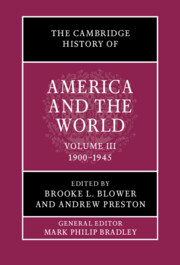Book contents
- The Cambridge History of America and the World
- The Cambridge History of America and the World
- The Cambridge History of America and the World
- Copyright page
- Contents
- Figures
- Maps
- Contributors to Volume III
- General Introduction: What is America and the World?
- Introduction to Volume III
- Part I American Power in the Modern Era
- Part II Competing Perspectives
- 12 Fighting Jim Crow in a World of Empire
- 13 Wilsonianism and Its Critics
- 14 Humanitarianism and US Foreign Assistance
- 15 Women’s Politics in International Context
- 16 The October Revolution and the American Left
- 17 Sexuality and Sexual Politics
- 18 Religious World Views
- 19 Indigenous Sovereignties and Social Movements
- 20 Fascism and Nativism
- Part III The Perils of Interdependence
- Index
18 - Religious World Views
from Part II - Competing Perspectives
Published online by Cambridge University Press: 12 November 2021
- The Cambridge History of America and the World
- The Cambridge History of America and the World
- The Cambridge History of America and the World
- Copyright page
- Contents
- Figures
- Maps
- Contributors to Volume III
- General Introduction: What is America and the World?
- Introduction to Volume III
- Part I American Power in the Modern Era
- Part II Competing Perspectives
- 12 Fighting Jim Crow in a World of Empire
- 13 Wilsonianism and Its Critics
- 14 Humanitarianism and US Foreign Assistance
- 15 Women’s Politics in International Context
- 16 The October Revolution and the American Left
- 17 Sexuality and Sexual Politics
- 18 Religious World Views
- 19 Indigenous Sovereignties and Social Movements
- 20 Fascism and Nativism
- Part III The Perils of Interdependence
- Index
Summary
From the Puritans to President Ronald Reagan, many Americans have viewed their nation as a model for the rest of the world to emulate. In part they believed that the American people’s fervent religious commitments and their incorporation of religion into public life and policy made the United States exceptional among the world’s leading powers. Yet when the founders crafted the US Constitution and the Bill of Rights, they ensured that the federal government could not establish an official church, and they insisted that Americans maintain the right to exercise their faiths freely. Religious leaders, lacking state support, sought creative ways to remain relevant, to strengthen and expand the power and influence of religion in their nation and abroad. They sought new and innovative ways to make the United States the world’s “city on a hill.”1
- Type
- Chapter
- Information
- The Cambridge History of America and the World , pp. 429 - 451Publisher: Cambridge University PressPrint publication year: 2022

